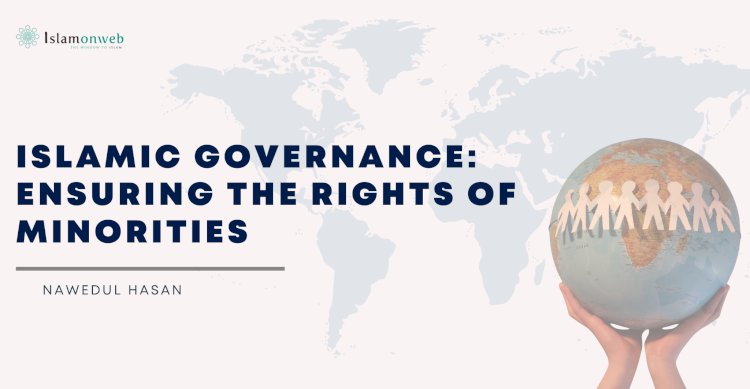Islamic Governance: Ensuring the Rights of Minorities
The term "dhimmi" refers to non-Muslims living under an Islamic government who are granted legal protections and rights. This concept embodies an agreement of safety and security, ensuring that dhimmis, or 'protected people', have their lives, property, and freedom of religion safeguarded under Sharia law. Historically, dhimmi status was initially given to Jews, Christians, and Sabians, later extending to other religious groups like Hindus and Buddhists. While dhimmi implies protection, it has also been perceived negatively due to misunderstandings and anti-Islam sentiments. However, in practice, dhimmis are entitled to civil rights similar to Muslims, including the freedom to practice their religion without coercion.
Islamic teachings emphasise justice and equality for all individuals, regardless of their faith, and the state has a responsibility to uphold these rights. Historical examples illustrate the commitment to ensuring security for non-Muslims, such as the punishment of a Muslim who harmed a Jewish man. The Islamic government also allows non-Muslims to engage in practices forbidden in Islam privately, without interference and ensures the preservation of their religious sites. Additionally, the jizya tax, levied on non-Muslims for protection, has provisions for exemptions and support for those in need, reinforcing the obligation of the state to care for all its citizens, Muslim and non-Muslim alike.
Non-Muslims in Islamic countries are classified into two main categories rather than by their specific faiths. The first category is non-Muslim citizens, known as 'People of the Covenant' (dhimmi), who are under the protection of the Muslim caliphate and have certain rights regarding wealth, land, and identity, as evidenced by historical letters from figures like Caliph Abu Bakr to the non-Muslims of Najran and mam Al-Awza'i’s letter to the Abbasid governor Salih ibn Ali concerning the treatment of non-Muslims. The second category includes individuals termed 'musta'minun' (seekers of protection), which refers to non-Muslims who come to Muslim lands for work or other purposes and hold a protected status.
In the land under Islamic governance, there are many rights granted to non-Muslims, including the following:
1) Preservation of Their Dignity as Human Beings
Allah Almighty has elevated human dignity above all creatures, as stated in the Quran, which calls for respect towards all individuals, including Muslims and non-Muslims. The Quran encourages respectful interactions with the People of the Book and prohibits insults towards the deities of polytheists, emphasising the importance of maintaining dignity among all. The teachings of Prophet Muhammad further stress honouring humanity regardless of faith. Historical instances, such as the case of a Copt seeking justice from Umar ibn al-Khattab for an unjust punishment, exemplify the protection of non-Muslim rights and the commitment to fairness, showcasing Islam's advocacy for justice and universal respect for human dignity.
2) Rights to Freedom of Belief
The teachings of Prophet Muhammad highlighted the significance of freedom of belief, allowing individuals to either embrace Islam or maintain their existing faith, with protections for non-converts in Muslim territories. He advocated for ethical military conduct, prohibiting harm to innocents and emphasising warfare only for the sake of Allah, presenting options of conversion, taxation (Jizyah), or battle when faced with enemies. The Quran reinforces the principle that there should be no compulsion in religion, underscoring personal choice in faith. This tradition of tolerance was upheld by the Caliphs, exemplified by the treaty of Umar and the restoration of sacred sites under Sultan Suleiman in Jerusalem. However, history also reflects periods of intolerance, such as the expulsion of Muslims from Spain during the Reconquista, illustrating the complex dynamics of coexistence and conflict among different religions within Islamic governance.
3) Rights to Follow Their Religious Laws
Islam emphasises the freedom of religious belief for non-Muslims, allowing them to practice their faith without coercion to convert. While some view the jizya, a tax imposed on non-Muslims, as protective, it is grounded in the broader responsibilities of Muslims, such as paying zakat to alleviate poverty and defending their land through jihad. Non-Muslims are permitted to follow their own religious laws in personal matters, and Islamic penalties apply to them only for universally recognised sins. Early Islamic leaders, like Khalifa Umar bin Abdul Aziz, grappled with how to manage non-Muslim practices that contradicted Islamic norms, ultimately affirming that the payment of jizya grants them the right to practice their beliefs freely, as long as they do not disrupt public order.
4) Rights to Justice
In the Quran, Allah commands justice and fairness for all individuals, emphasising the importance of returning trust and judging impartially, regardless of one's faith. This principle is illustrated through various stories, such as that of Taimah ibn Ubayriq, who stole from his neighbour and falsely accused a Jewish man. Initially swayed by Taimah's tribe, Prophet Muhammad received Quranic revelations that condemned the deceitful accusations and upheld the innocent. This narrative underscores the Quran's dedication to truth and justice, reflecting the broader Islamic commitment to equitable treatment.
Another significant example involves Caliph Umar ibn al-Khattab, who held Muhammad, the governor's son, accountable for unjustly beating a Jewish man, demonstrating that justice applies equally, regardless of status. Similarly, Imad Ad-Din Zangi sided with a Jewish man whose property was wrongfully seized, reinforcing fair treatment under Islamic governance. Historical instances, such as Caliph Umar bin Abdul Aziz's response to Qutayba's actions in Transoxiana, further exemplify these values, showcasing that ethical behaviour leads to voluntary acceptance of Islam. Overall, these narratives illustrate the foundational Islamic principle that justice must be upheld for everyone, including non-Muslims.
5) Right to the Security of Their Lives, Property, and Honour
Islam emphasises the sanctity of human life, property, and dignity for everyone, mandating that Muslims protect the rights of both Muslims and non-Muslims alike, as commanded by Allah. Killing is only permissible in specific legal circumstances, and violations of this principle are condemned. The Prophet Muhammad and Caliph Umar ibn al-Khattab reinforced that a non-Muslim's life holds equal value to that of a Muslim under Islamic law. Jihad is to be conducted solely for the sake of Allah, without coercion into faith, and justice must be upheld for non-Muslims, including restitution for stolen property. Historical examples, such as the actions of Ibn Tulun, showcase the commitment to protecting non-Muslims’ rights. Islam establishes that communal responsibility exists in safeguarding the covenant with non-Muslims, highlighting the importance of security and protection for all individuals seeking refuge within Muslim territories.
6) Right to Protection from Aggression
One of the fundamental rights granted to non-Muslims under Islamic rule is protection from external aggression, which is part of the social contract established when they pay the jizyah tax in exchange for safety and security. Islamic scholars, such as Ibn Hasan, emphasise the obligation of Muslims to defend non-Muslims, highlighting the deep-rooted commitment to safeguarding all individuals living peacefully under Islamic governance. Historical examples illustrate this principle, where treaties were honoured even during conflicts, showcasing the reciprocal trust between Muslim rulers and non-Muslims. For instance, after victories, Muslim armies assured protection and safe passage to non-Muslims, including Byzantine citizens, reinforcing the ethical standards of Islamic leadership. This consistent behaviour underscores the commitment to upholding agreements that ensure the safety and dignity of non-Muslims, reflecting the integrity of the Islamic State in its treatment of diverse communities.
7) Right to Good Treatment
Islam promotes kindness, generosity, and respect towards non-Muslims, as demonstrated in both the Quran and Prophet Muhammad's (PBUH) actions. The Prophet exemplified this through his relationships with non-Muslims, such as his generosity towards his neighbours, caring for a woman without her knowledge, and compassionately handling a debt dispute with a Jewish man, which ultimately led to the man's conversion to Islam. Islamic rulers followed this principle, as seen in the actions of Umar ibn Al-Khattab, who supported a Jewish family, and Imam Abdul Qadir Al-Jaza'iri, who provided security to former enemies. Historical accounts, including those from Western historians, highlight Muslims' respectful treatment of non-Muslims throughout history, exemplified in places like al-Andalus, where mutual respect flourished.
8) Right to social security
Islam has a long-standing tradition of providing social welfare that predates many modern welfare systems, with zakat being a central mechanism for wealthier Muslims to assist the less fortunate in their communities. This principle of social justice extends beyond Muslims to include non-Muslims, as Islamic law (Sharia) requires rulers to ensure assistance for all citizens, particularly those unable to work due to disabilities or hardships. Historical examples illustrate this commitment, such as Umar ibn Al-Khattab’s support for a Jewish man in need and his efforts to provide financial assistance to Christian groups in Damascus, reflecting the Quran's emphasis on kindness and equity for all.
The Islamic framework also underscores the rights of non-Muslims, ensuring that their wealth is protected and not seized during conflicts. Specific exemptions from the jizyah tax demonstrate this commitment, as individuals unable to meet basic needs or those in vulnerable positions were not burdened. The teachings of Islam advocate for justice and compassion towards everyone, regardless of faith, emphasising that fair treatment and support should be extended to all members of society. This comprehensive approach to social security and justice highlights Islam's dedication to fostering a compassionate and equitable society.
About of author
Nawedul Hasan, Sitamarhi, Bihar, is a first-year student of the Dept. of Quran and related Sciences in UG campus at Darul Huda Islamic University, Chemmad, Kerala.
Bibliography
- Husain, Saleh. The Rights of Non-Muslims in the Islamic World. ● Ibn Hamdoon, At-Tadhkirah al-Hamduniyah. Beirut: Dar Sadir, 1996. ● At-Tantawi, Ali, and Naji. The History of 'Umar. Beirut: Dar Al-Fikir, 1973. ● Al-Qardawi, Yousef. Non-Muslims in Muslim Society. Cairo: Maktabat Wahbah. ● Al-Qardawi, Yousef. Religious Minorities: The Islamic Solution. Beirut: Almaktab al-Islami.
- At-Tirmidhi, Abu Isa. Sunan At-Tirmidhi. Beirut: Dar Sihnoon.
Disclaimer
The views expressed in this article are the author’s own and do not necessarily mirror Islamonweb’s editorial stance.
























Leave A Comment